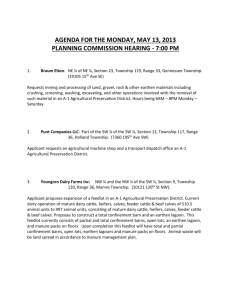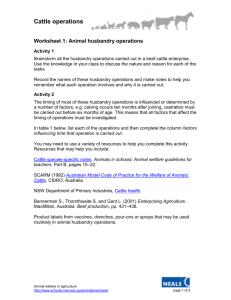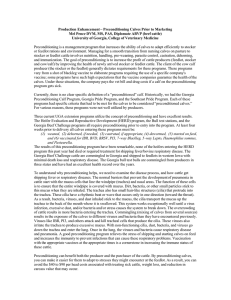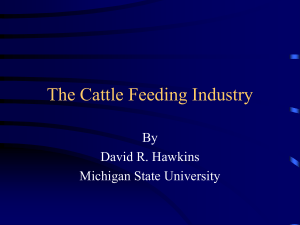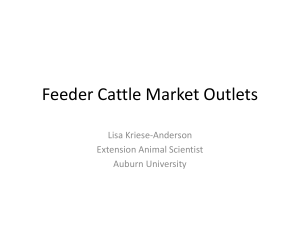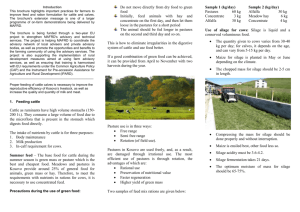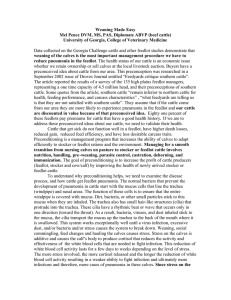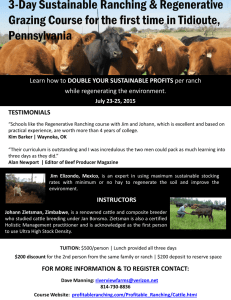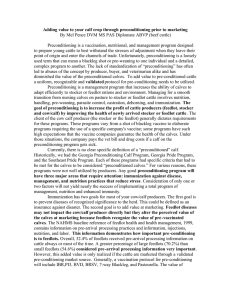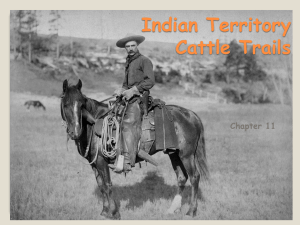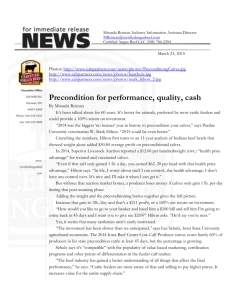Beef Cattle Nutrition
advertisement
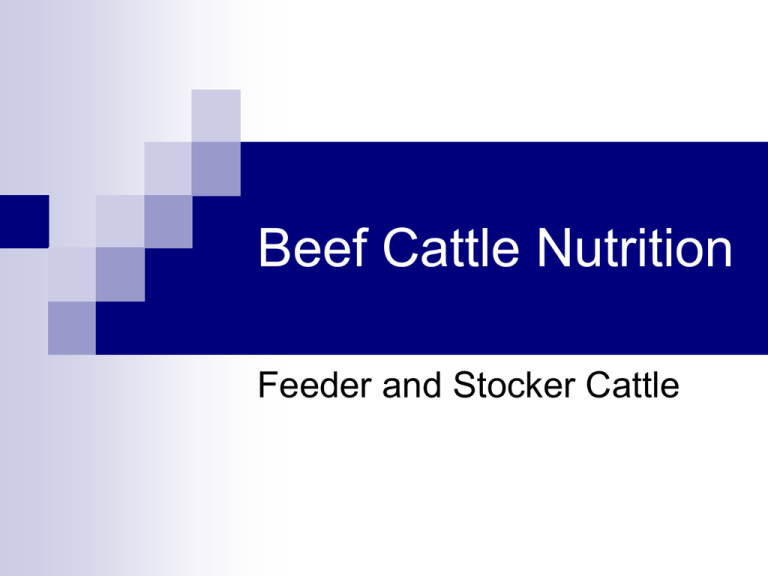
Beef Cattle Nutrition Feeder and Stocker Cattle Market Beef Lifecycle Calves Birth 0 Weaning 6-7 Stocker 9-10 Growing Yearlings 12 14 and older Finishing Age of animal, months Harvest Preconditioning Nutrition guidelines: Creep feed and bring feeder into feedlot Palatable diet, not dusty Feed long-stem hay and topdress grain for a few days Feed in a bunk to get used to it Preconditioning Free-choice watering system Loose free-choice salt Increased mineral needs prior to shipping Avoid silage or fermented feeds-smell will drive them off Caution with lots of grain: acidosis, bloat, founder Stocker Cattle Weaned calves that are forage-fed for a period of time before being sold to enter a feedlot For spring born calves bought in fall: Winter on high-roughage diets in drylot Winter graze on wheat/winter oats, or fescue Winter on stocks (corn or milo) until gone, then feed silage with CP (legume/supplement) in feedlot Other Feedstuffs High energy supplementation, but need low starch Soy hulls Wheat midds Brewers grains Fed up to 6 lbs/day to 500 lbs calves Protein supplementation Limited by energy, so CP may not get response Balance between expected performance and cost of supplementation (Feed:Gain = 5:1) Bar F Cattle Company Stocker cattle and preconditioning operation in north central Arkansas ~1200 head at a time ~9000 head move through in a year Calves range from 400-650 lbs at start Calves from TN, AR, NC, KY, MO, GA, AL Backgrounded Cattle Transition Rations First time calves into feedlot-goal is to minimize disease and death loss Get them eating! Medium quality roughage free-choice Plus protein supplement if needed After 2-3 days-add grain at rate of .5 lb/100 lbs Market Cattle Requirements Generally 2-3% of BW for DM intake CP-between 9 and 14% Feedlot cattle average 12-14% TDN-65-85% Calcium-0.3-0.6% Phosphorus-0.2-0.4% Considerably higher with byproducts Ca:P ratio of 2 (or greater):1 to avoid urinary calculi Backgrounded Cattle Weaned calves placed in drylot or pasture with more emphasis on growing than stocker calves Fed grain + roughage Target finish is 800+ lb Move straight to finishing ration Growing Cattle Growing calves in feedlot until switched to finishing ration More roughage than concentrate generally Phase 1 feeding-50-60% concentrate from 450800 lb Traditionally mostly silage diet now stalks, hay Phase 2 feeding->75% concentrate over 800 lb (mostly grain diet) Finishing Cattle Target is to increase marbling-improve quality Concentrate:roughage ratio of 85:15 or higher Faster gains on higher concentrate diet Increase in TDN by 10% may decrease intake by 10% High concentrate diets can lead to problems like acidosis, founder, and liver abcesses Feedlots in Iowa Feed Additives Feed Additives Non-nutritive ingredients added to the diet Examples commonly used: Medications Flavorings Colorings Growth promotants Antioxidants (preservatives) Antibiotics Inhibits growth of some (not all) microbes Continuous inclusion-in diet all the time Coccidiostats Short-term inclusion-used to cure/treat a disease Examples: Tetracyclines, Tylan, Penicillin Should antibiotics be utilized in livestock feeds? Bacteria become resistant to antibiotics Super bugs, antibiotic treatment becomes useless Ionophores Commonly fed to cattle, kill certain rumen bacteria Beef cattle (cows and feedlot) Changes rumen bug population so can improved feed use Considered an antibiotic Examples: Rumensin, Bovatec TOXIC to horses! Ionophores Commonly used: Ralgo, Active for 60-100 days after insertion into ear Increased gains Steers Synovex (S,H), Compudose, Revalor 8-12% and heifers 6-10% Increased efficiency (feed to gain) Steers 5-8% and heifers 4-7% Hormonal Effect Additives MGA-fed to feedlot heifers, to suppress heat Acts like progesterone in female cattle P4 is pregnancy hormone- MGA tricks body Increases gain because heifers will go off feed during estrus- riding, etc Approved for use to synchronize estrous cycle in breeding females Feed continuously and then withdraw-->estrous Questions?
